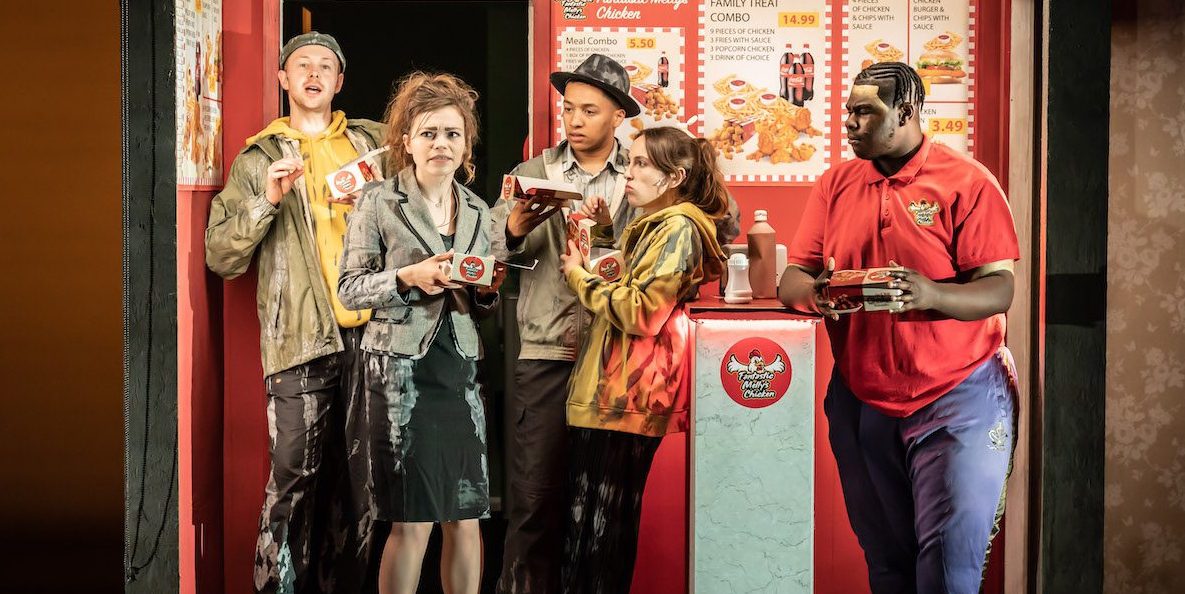In this new play Annie Siddons draws on her own life-experiences in Southeast London to rework ‘The Bacchae’ by Euripides for a contemporary audience. This is very suitable source material for a student production for a variety of reasons. On a structural level the chorus is more than usually active in the action and that ensures plenty of roles to share around in addition to the named characters – it is a true ensemble piece. In addition, the themes evoked in the original transfer well into a discussion of the rights and wrongs of social protest in contemporary Britain.
In the original tragedy, the god Dionysus returns to his home community and finds no recognition or acceptance from traditional authority figures, whom he challenges by inviting his followers to embrace an ecstatic alternative frame of mind to overthrow tradition. This they do to devastating effect by destroying their king, Pentheus, whose own mother decapitates him before realising what she has done. There are important questions here. What is the right balance between structure and order and freedom and irrationality? If you are desperate and marginalised how much resistance is justified? How can people in authority find empathy with the dispossessed, or is that a pipe dream?
By transposing these questions to Southeast London, where Pentheus is a local benefit office supervisor, and life for many revolves around a ‘trinity’ of chicken wings, fries and coke these concerns are made strikingly real and immediate, especially when played with the vigour, humour and intensity of this talented cast. The action revolves around Dennis, the god disguised as a fast-food vendor; Wendy, an abandoned child who has declined into addiction after losing her mother in a freak accident; and Neil, the unsympathetic middle-class benefits supervisor, taking out the frustrations of his home life on helpless welfare recipients. But there is a whole host of supporting characters all vividly brought to life by their talented players.
Much of the text is in verse, as a nod to the formal rigour of the original, and this is interspersed with episodes of song, music and dance, again a tribute to the full dramatic experience associated with Greek theatre (whose patron was of course the god Dionysus!) Crucial to the success of the whole is the remarkably versatile set designed by Zoë Hurwitz, which opens up different venues on a revolve before it all flies apart as the action moves from gritty realism into fantasy and two alternative endings. This is a marvellous vindication of the Guildhall’s School of enabling student actors to work with a creative team with a wealth of professional experience and invention, from which both sides benefit.
With such a large cast, all with significant contributions to make, it is invidious to dwell too long on individuals, but a few of the performances need some highlighting. As Dennis, the hidden god, Tyreke Leslie does a good job in combining compassion with an air of mystery and making the case for mutual human empathy with humour. Annabella Jennings’ Wendy portrays a long emotional journey from withdrawn self-disdain through to powerful eloquence and self-acceptance. Isobel Fairchild plays two roles, most notably depicting the transition from downtrodden housewife to sexually liberated rioter. Perhaps the hardest role of all is taken by Jonny Burman as the unsympathetic local official who has to re-learn his values the hardest of ways. He avoids cartoon villainy and his ultimate redemption, if that is what it is, is already hinted at and anticipated in some finely graded moments of earlier self-doubt.
My only cavil, a frequent one at present, is overuse of a hand-held camera for projection of close-ups, which is in danger of becoming a dramatic cliché. This aside, the play deserves to succeed and to be seen again. Just as ‘The Bacchae’ is a play that defies easy categorisation, so this adaptation manages to encompass both graphic social criticism and deft comic entertainment with great success. And as someone who lives near Penge myself, I shall now have to look at my home ‘hood with new eyes.

